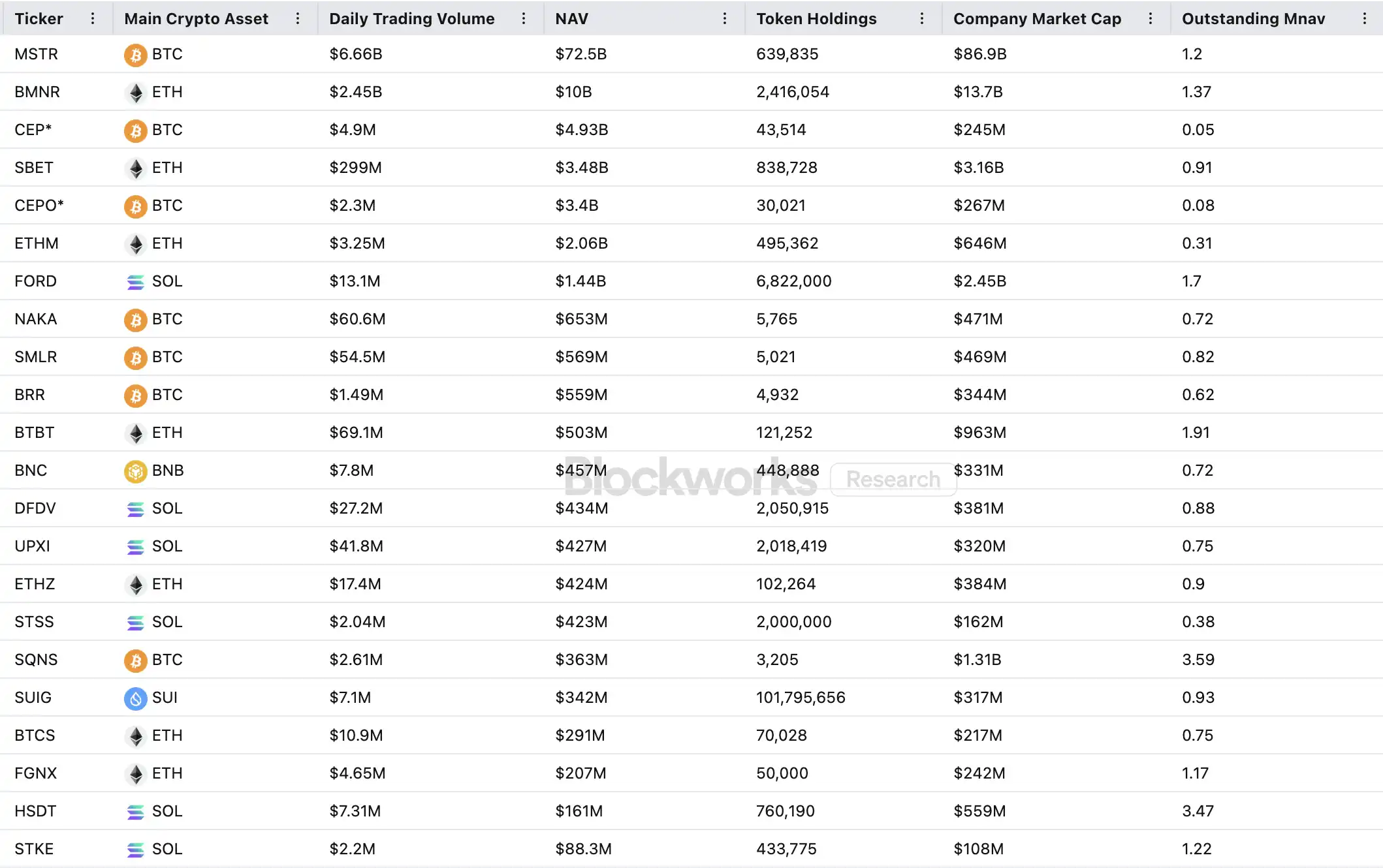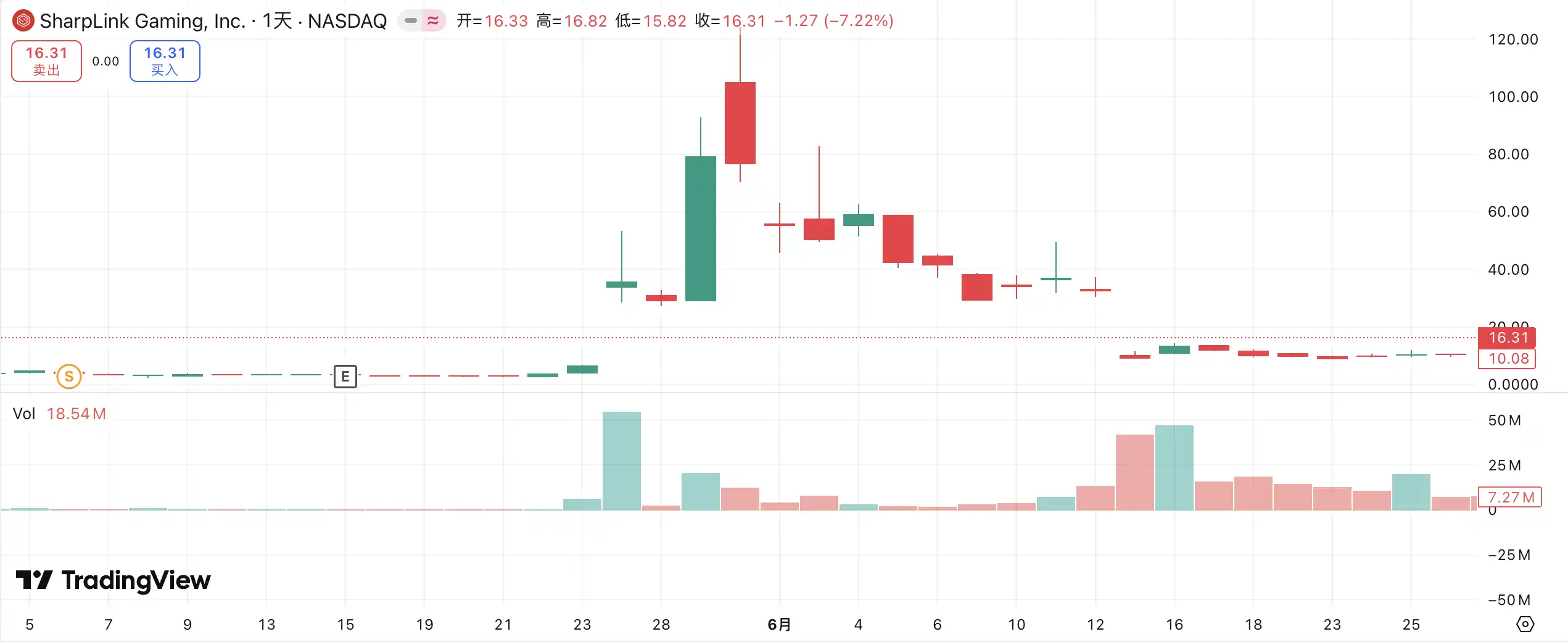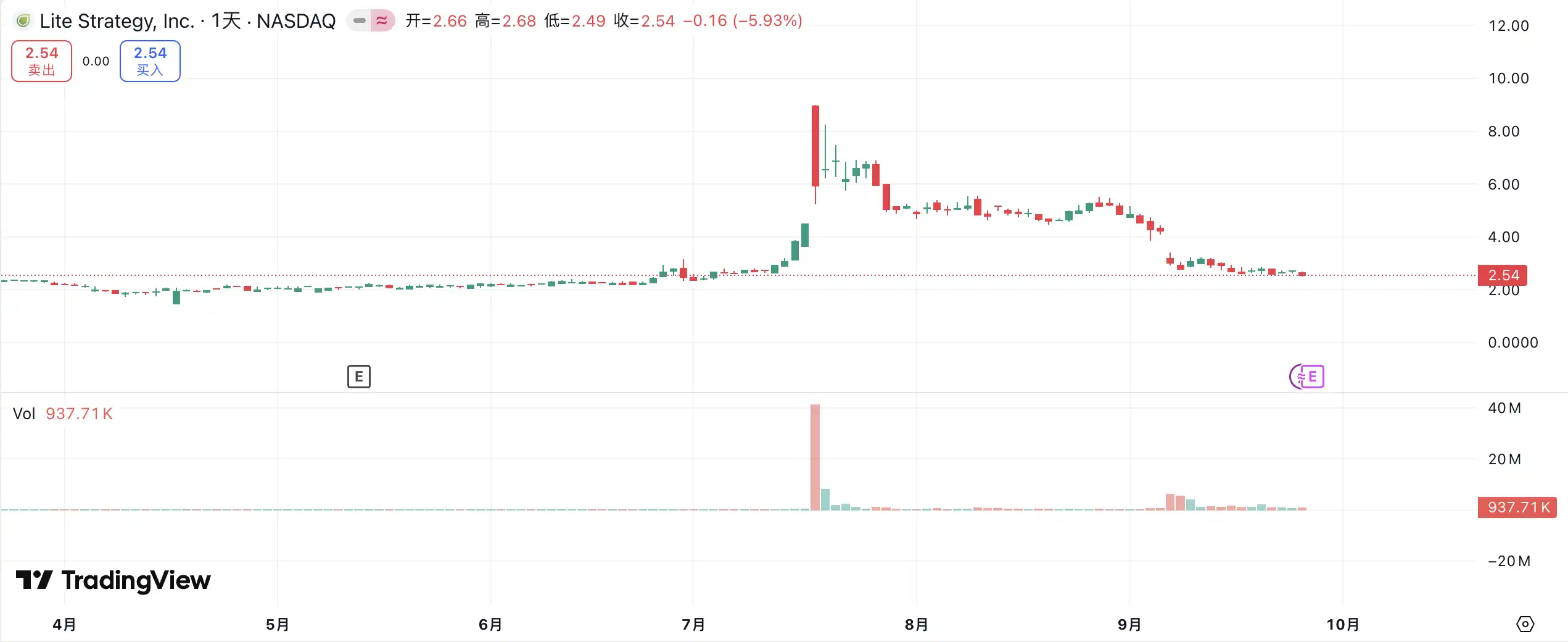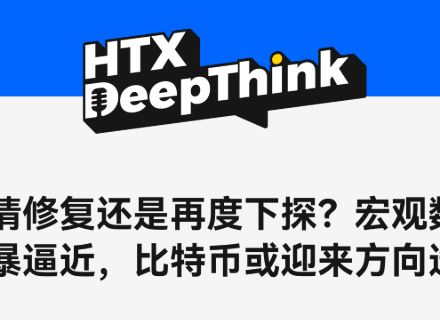With regulatory scrutiny intensifying, the crypto treasury narrative faces a bubble purge.
Author: KKK
Original Title: The US SEC Starts Targeting Crypto Treasury Companies, Will the DAT Narrative Continue?
On September 24, the US Securities and Exchange Commission (SEC) and the Financial Industry Regulatory Authority (Finra) jointly announced that they would investigate more than 200 listed companies that had announced crypto treasury plans, citing “abnormal stock price fluctuations” commonly observed before these companies released related news.
Since MicroStrategy first included bitcoin in its balance sheet, “Crypto Treasury” has become a sensational “financial alchemy” in the US stock market—newcomers like Bitmine and SharpLink saw their stock prices soar dozens of times due to similar moves. According to data released by Architect Partners, since 2025, 212 new companies have announced plans to raise about $102 billion to purchase mainstream crypto assets such as BTC and ETH.
However, while this capital frenzy has driven up prices, it has also sparked widespread skepticism. MSTR’s mNAV (the ratio of market capitalization to book net asset value) dropped from 1.6 to 1.2 within a month, and two-thirds of the top twenty crypto treasury companies have an mNAV below 1. Concerns about asset bubbles and insider trading are mounting, and this new asset allocation trend is now facing unprecedented regulatory challenges.

How Does the Crypto Treasury Company Flywheel Operate?
The financing flywheel of treasury companies is built on the mNAV mechanism, which is essentially a reflexive flywheel logic that gives treasury companies the seemingly “unlimited ammo” in a bull market. mNAV refers to the market net asset value ratio, calculated as the company’s market capitalization (P) relative to its net asset value per share (NAV). In the context of treasury strategy companies, NAV refers to the value of their held digital assets.
When the stock price P is higher than the net asset value per share NAV (i.e., mNAV > 1), the company can continuously raise funds and reinvest the proceeds into digital assets. Each new issuance and purchase increases the per-share holdings and book value, further strengthening market confidence in the company’s narrative and driving the stock price higher. Thus, a closed-loop positive feedback flywheel begins to spin: mNAV rises → new fundraising → purchase of digital assets → per-share holdings increase → market confidence strengthens → stock price rises again. It is through this mechanism that MicroStrategy has been able to continuously raise funds to buy bitcoin over the past few years without severely diluting its shares.
Once the stock price and liquidity are pushed high enough, the company can unlock a whole set of institutional funding mechanisms: issuing debt, convertible bonds, preferred shares, and other financing tools, turning the market narrative into assets on the books, which in turn pushes the stock price higher, forming a flywheel. The essence of this game is the complex resonance between stock price, story, and capital structure.
However, mNAV is a double-edged sword. A premium can represent high market trust, but it may also be mere speculation. Once mNAV converges to 1 or falls below 1, the market switches from an “accretion logic” to a “dilution logic.” If at this time the token price itself falls, the flywheel turns from positive to negative feedback, causing a double blow to market cap and confidence. In addition, treasury strategy companies’ financing is also built on the mNAV premium flywheel; when mNAV remains at a discount for a long time, the space for new issuance is blocked, and the business of small- and mid-cap shell companies that are already stagnant or on the verge of delisting will be completely overturned, and the established flywheel effect will collapse instantly. In theory, when mNAV < 1, a more reasonable choice for the company is to sell holdings and buy back shares to restore balance, but this is not always the case—discounted companies may also represent undervalued assets.
During the bear market in 2022, even when MicroStrategy’s mNAV once fell below 1, the company did not choose to sell coins and buy back shares, but instead insisted on retaining all its bitcoin through debt restructuring. This “hold to the death” logic comes from Saylor’s faith-based vision for BTC, treating it as a core collateral asset that will “never be sold.” But this path cannot be copied by all treasury companies. Most altcoin treasury stocks lack stable main businesses, and transforming into a “coin-buying company” is just a survival tactic, without the support of faith. Once the market environment deteriorates, they are more likely to sell off to stop losses or realize profits, triggering a stampede.
Related reading: “First Coin Sale, Delisting, Crypto Stocks Are No Longer the Pixiu of Cryptocurrency”
Does Insider Trading Exist?
SharpLink Gaming is one of the earliest cases in this round of “crypto treasury fever” to cause a market stir. On May 27, the company announced it would increase its holdings of up to $425 million in Ethereum as reserve assets. On the day the news was released, the stock price soared to $52. Strangely, as early as May 22, the stock’s trading volume had already surged, and the price jumped from $2.7 to $7, even though the company had not yet made any announcement or disclosed any information to the SEC.

This phenomenon of “news not yet released, but stock price moves first” is not unique. On July 18, MEI Pharma announced a $100 million Litecoin treasury strategy, but the stock price had already risen for four consecutive days before the news, from $2.7 to $4.4, nearly doubling. The company did not submit any major updates or release a press statement, and its spokesperson declined to comment.

Similar situations also occurred in companies such as Mill City Ventures, Kindly MD, Empery Digital, Fundamental Global, and 180 Life Sciences Corp, all of which experienced varying degrees of abnormal trading fluctuations before announcing their crypto treasury plans. Whether there was information leakage and preemptive trading has attracted regulatory attention.
Will the DAT Narrative Collapse?
Arthur Hayes, advisor to “Solana MicroStrategy” Upexi, pointed out that crypto treasury has become a new narrative in the traditional corporate finance circle. He believes this trend will continue to evolve across multiple mainstream asset tracks. However, we must clearly see: on each chain, at most only one or two winners can ultimately emerge.
Meanwhile, the head effect is accelerating. Although more than 200 companies have announced crypto treasury strategies in 2025, covering BTC, ETH, SOL, BNB, TRX, and other chains, funds and valuations are rapidly concentrating in a very small number of companies and assets—BTC treasuries and ETH treasuries account for the vast majority of DAT companies. In each asset category, only one or two companies can truly break out: in the BTC track it’s MicroStrategy, in the ETH track it’s Bitmine, and in the SOL track it may be Upexi; other projects find it hard to compete at scale.

As Michael Saylor has demonstrated, there are a large number of institutional fund managers in the market who want bitcoin risk exposure but cannot buy BTC directly or hold ETFs—but they can buy MSTR stock. If you can package a company holding crypto assets into their “compliance basket,” these funds are willing to pay $2, $3, or even $10 for assets worth only $1 on the books. This is not irrational; it is regulatory arbitrage.
In the latter half of the cycle, new issuers will continue to emerge, resorting to more aggressive corporate finance tools to pursue greater stock price elasticity. When prices fall, these practices will backfire. Arthur Hayes predicts that this cycle will see a major DAT incident similar to the FTX blowup. At that time, these companies will crash, and their stocks or bonds may see huge discounts, causing significant market turmoil.
Regulators have also noticed this structural risk. In early September, Nasdaq proposed enhanced scrutiny of DAT companies; today, the SEC and FINRA have jointly launched an investigation into insider trading. These regulatory moves are intended to compress the space for insider activity, raise issuance thresholds and financing difficulty, and thus reduce the room for manipulation by new DAT companies. For the market, this means “pseudo-leaders” will be cleared out faster, while true leading companies will continue to survive and even grow stronger through the narrative.
Summary
The crypto treasury narrative persists, but higher thresholds, stricter regulation, and bubble clearing will proceed simultaneously. For investors, it is necessary to understand the logic and arbitrage paths behind the financial structure, and to always be alert to the risk accumulation behind the narrative—this “on-chain alchemy” cannot go on indefinitely. The winner takes all, and the losers exit.
Disclaimer: The content of this article solely reflects the author's opinion and does not represent the platform in any capacity. This article is not intended to serve as a reference for making investment decisions.
You may also like
Ethereum Staking Weekly Report December 1, 2025
🌟🌟Core Data on ETH Staking🌟🌟 1️⃣ Ebunker ETH staking yield: 3.27% 2️⃣ stETH...

The Blood and Tears Files of Crypto Veterans: Collapses, Hacks, and Insider Schemes—No One Can Escape
The article describes the loss experiences of several cryptocurrency investors, including exchange exits, failed insider information, hacker attacks, contract liquidations, and scams by acquaintances. It shares their lessons learned and investment strategies. Summary generated by Mars AI This summary was produced by the Mars AI model, and the accuracy and completeness of its generated content are still in the process of iterative improvement.

Mars Morning News | Federal Reserve officials to advance stablecoin regulatory framework; US SEC Chairman to deliver a speech at the New York Stock Exchange tonight
Federal Reserve officials plan to advance the formulation of stablecoin regulatory rules. The SEC Chair will deliver a speech on the future vision of capital markets. Grayscale will launch the first Chainlink spot ETF. A Coinbase executive has been sued by shareholders for alleged insider trading. The cryptocurrency market fear index has dropped to 23. Summary generated by Mars AI This summary was generated by the Mars AI model, and the accuracy and completeness of its content are still in the process of iterative updates.

OECD's latest forecast: The global interest rate cut cycle will end in 2026!
According to the latest forecast from the OECD, major central banks such as the Federal Reserve and the European Central Bank may have few "bullets" left under the dual pressures of high debt and inflation.
